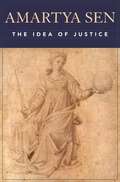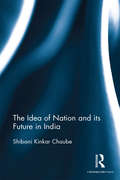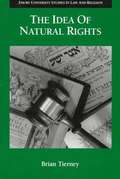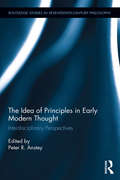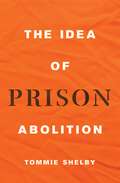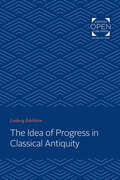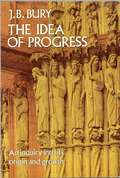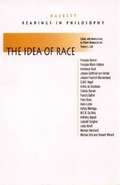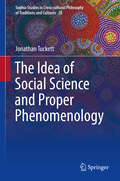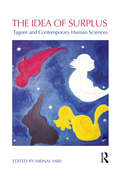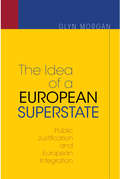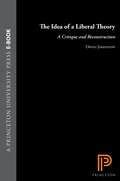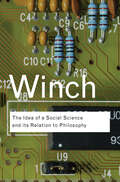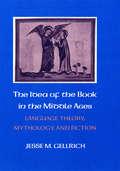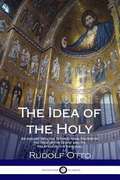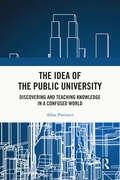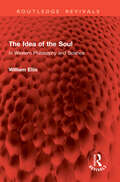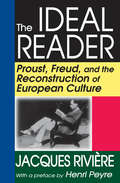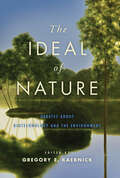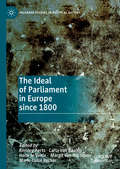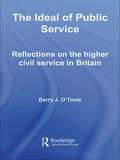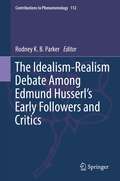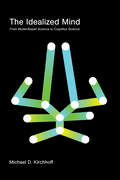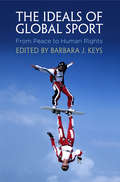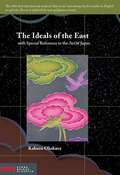- Table View
- List View
The Idea of Justice
by Amartya SenCreated by the continuous feedback of a "student-tested, faculty-approved" process, RELG: WORLD, Second Edition, delivers a visually appealing and succinct print component, tear-out review cards, and a consistent online offering with CourseMate that includes an eBook and a set of interactive digital tools--all at a value-based price. This book frames different religions as encounters between the religions' adherents and individuals who are much like readers, making the subject come alive. The eBook includes numerous annotated links to videos, audio, Google Earth(tm) explorations, and primary sources.
The Idea of Nation and its Future in India
by Shibani Kinkar ChaubeThis volume is a theoretico-empirical study of nations and nationalism on a global scale. It enquires if the idea of the nation, by its own logic, is feasible and whether India fulfils the requirement of nationhood with a reasonable prospect of survival. The monograph engages with the theories of nation and nationalism and examines if they are relevant and tenable in contemporary times. It looks at the way these ideas have acted out in the Indian nation while attempting to map its future trajectory. It also asks: how do the two fundamental challenges to the idea of nation – ethnicity and class – fare in the era of globalisation; and further, how does India, a new state in an ancient society, reconceptualise the paradigm of this debate? The book will be of great interest to scholars and students of political science, political theory, history, political philosophy, and South Asian studies, as well as informed general readers.
The Idea of Natural Rights: Studies on Natural Rights, Natural Law and Church Law, 1150-1625
by Brian Tierney. " . . a compelling historical account of natural rights. . . . That Tierney brings to his historical task a thorough acquaintance with major contemporary theories of moral and legal rights gives his work additional value for ethicists. " - Religious Studies Review . " . . a tour de force of integration and learning. . . . It is a synthesis that will become the required starting point in all future efforts to write about the history of rights. " - Studia canonica This series, originally published by Scholars Press and now available from Eerdmans, is intended to foster exploration of the religious dimensions of law, the legal dimensions of religion, and the interaction of legal and religious ideas, institutions, and methods. Written by leading scholars of law, political science, and related fields, these volumes will help meet the growing demand for literature in the burgeoning interdisciplinary study of law and religion.
The Idea of Principles in Early Modern Thought: Interdisciplinary Perspectives (Routledge Studies in Seventeenth-Century Philosophy)
by Peter R. AnsteyThis collection presents the first sustained examination of the nature and status of the idea of principles in early modern thought. Principles are almost ubiquitous in the seventeenth and eighteenth centuries: the term appears in famous book titles, such as Newton’s Principia; the notion plays a central role in the thought of many leading philosophers, such as Leibniz’s Principle of Sufficient Reason; and many of the great discoveries of the period, such as the Law of Gravitational Attraction, were described as principles. Ranging from mathematics and law to chemistry, from natural and moral philosophy to natural theology, and covering some of the leading thinkers of the period, this volume presents ten compelling new essays that illustrate the centrality and importance of the idea of principles in early modern thought. It contains chapters by leading scholars in the field, including the Leibniz scholar Daniel Garber and the historian of chemistry William R. Newman, as well as exciting, emerging scholars, such as the Newton scholar Kirsten Walsh and a leading expert on experimental philosophy, Alberto Vanzo. The Idea of Principles in Early Modern Thought: Interdisciplinary Perspectives charts the terrain of one of the period’s central concepts for the first time, and opens up new lines for further research.
The Idea of Prison Abolition (Carl G. Hempel Lecture Series #13)
by Tommie ShelbyAn incisive and sympathetic examination of the case for ending the practice of imprisonmentDespite its omnipresence and long history, imprisonment is a deeply troubling practice. In the United States and elsewhere, prison conditions are inhumane, prisoners are treated without dignity, and sentences are extremely harsh. Mass incarceration and its devastating impact on black communities have been widely condemned as neoslavery or &“the new Jim Crow.&” Can the practice of imprisonment be reformed, or does justice require it to be ended altogether? In The Idea of Prison Abolition, Tommie Shelby examines the abolitionist case against prisons and its formidable challenge to would-be prison reformers.Philosophers have long theorized punishment and its justifications, but they haven&’t paid enough attention to incarceration or its related problems in societies structured by racial and economic injustice. Taking up this urgent topic, Shelby argues that prisons, once reformed and under the right circumstances, can be legitimate and effective tools of crime control. Yet he draws on insights from black radicals and leading prison abolitionists, especially Angela Davis, to argue that we should dramatically decrease imprisonment and think beyond bars when responding to the problem of crime.While a world without prisons might be utopian, The Idea of Prison Abolition makes the case that we can make meaningful progress toward this ideal by abolishing the structural injustices that too often lead to crime and its harmful consequences.
The Idea of Progress in Classical Antiquity
by Ludwig EdelsteinOriginally published in 1967. Ludwig Edelstein characterizes the idea of "progress" in Greek and Roman times. He analyzes the ancients' belief in "a tendency inherent in nature or in man to pass through a regular sequence of stages of development in past, present, and future, the latter stages being—with perhaps occasional retardations or minor regressions—superior to the earlier." Edelstein's contemporaries asserted that the Greeks and Romans were entirely ignorant of a belief in progress in this sense of the term. In arguing against this dominant thesis, Edelstein draws from the conclusions of scholars of the nineteenth and early twentieth centuries and discusses ideas of Auguste Comte and Wilhelm Dilthey.
The Idea of Progress: An Inquiry Into its Origin and Growth
by J. B. BuryWide-ranging, erudite and stimulating, this thought-provoking volume describes the birth and development of one of the most important basic ideas of our civilization: progress, or the concept that humanity is advancing in a definite and desirable direction. Throughout, Bury examines the contributions of Darwin, Descartes, Voltaire, Locke, and other important thinkers.
The Idea of Race
by Tommy L. Lott Robert BernasconiA survey of the historical development of the idea of race, this anthology offers pre-twentieth century theories about the concept of race, classic twentieth century sources reiterating and contesting ideas of race as scientific, and several philosophically relevant essays that discuss the issues presented. A general Introduction gives an overview of the readings. Headnotes introduce each selection. Includes suggested further readings.
The Idea of Social Science and Proper Phenomenology (Sophia Studies in Cross-cultural Philosophy of Traditions and Cultures #28)
by Jonathan TuckettThis monograph examines an academic discipline in crisis. The author claims that this field concerned with society and relationships is in trouble. No one can seem to agree on what it does or how to go about doing it. His insightful argument revives the thought of key phenomenologists often no longer considered in social science. Looking predominantly at debates within religious studies, this book uncovers certain misguided presuppositions which have strongly influenced scholars in the field. This reflects itself in a Weberian Ideal regarding the institutional place of science in the universities and a failure to properly consider the epistemic status of knowledge produced for its own sake. But even recognizing these issues will not get to the core of the crisis. It will not help scholars better understand what it is to be human. To address this, the author digs deeper. He draws on the philosophical phenomenology of Husserl’s Phenomenological Movement to critique our very idea of social science. In the process, he presents a radical approach to the question of humanity. This volume concludes that, properly understood, social science is a hobby. It deserves no special place in the university. Indeed, if it is to be pursued properly, it requires a fundamentally revised understanding of humanity. The author argues this not of the sake of controversy. Rather, his intention is to affect the necessary shift in our understanding that will enable future constructive solutions.
The Idea of Surplus: Tagore and Contemporary Human Sciences
by Mrinal MiriThis book provides an analytical understanding of some of Tagore’s most contested and celebrated works and ideas. It reflects on his critique of nationalism, aesthetic worldview, and the idea of ‘surplus in man’ underlying his life and works. It discusses the creative notion of surplus that stands not for ‘profit’ or ‘value’, but for celebrating human beings’ continuous quest for reaching out beyond one’s limits. It highlights, among other themes, how the idea of being ‘Indian’ involves stages of evolution through a complex matrix of ideals, values and actions—cultural, historical, literary and ideological. Examining the notion of the ‘universal’, contemporary scholars come together in this volume to show how ‘surplus in man’ is generated over the life of concrete particulars through creativity. The work brings forth a social scientific account of Tagore’s thoughts and critically reconstructs many of his epochal ideas. Lucid in analysis and bolstered with historical reflection, this book will be a major intervention in understanding Tagore’s works and its relevance for the contemporary human and social sciences. It will interest scholars and researchers of philosophy, literature and cultural studies.
The Idea of a European Superstate: Public Justification and European Integration - New Edition
by Glyn MorganIs there a justification for European integration? The Idea of a European Superstate examines this--the most basic--question raised by the European Union. In doing so, Glyn Morgan assesses the arguments put forward by eurosceptics and their critics. In a challenge to both sides of the debate, Morgan argues in support of a European superstate. Unless Europe forms a unitary sovereign state, Europe will remain, so he maintains, weak and dependent for its security on the United States. The Idea of a European Superstate reshapes the debate on European political integration. It throws down a gauntlet to eurosceptics and euro-enthusiasts alike. While employing the arguments of contemporary political philosophy and international relations, this book is written in an accessible fashion that anyone interested in European integration can understand.
The Idea of a Liberal Theory: A Critique and Reconstruction
by David JohnstonLiberalism, the founding philosophy of many constitutional democracies, has been criticized in recent years from both the left and the right for placing too much faith in individual rights and distributive justice. In this book, David Johnston argues for a reinterpretation of liberal principles he contends will restore liberalism to a position of intellectual leadership from which it can guide political and social reforms. He begins by surveying the three major contemporary schools of liberal political thought--rights-based, perfectionist, and political liberalism--and, by weeding out their weaknesses, sketches a new approach he calls humanist liberalism.The core of Johnston's humanist liberalism is the claim that the purpose of political and social arrangements should be to empower individuals to be effective agents. Drawing on and modifying the theories of John Rawls, Michael Walzer, Ronald Dworkin, Joseph Raz, Amartya Sen, and others, Johnston explains how this purpose can be realized in a world in which human beings hold fundamentally different conceptions of the ends of life. His humanist liberalism responds constructively to feminist, neo-Marxist, and other criticisms while remaining faithful to the core values of the liberal tradition.
The Idea of a Social Science and its Relation to Philosophy
by Peter WinchIn the fiftieth anniversary of this book's first release, Winch's argument remains as crucial as ever. Originally published in 1958, The Idea of a Social Science and Its Relation to Philosophy was a landmark exploration of the social sciences, written at a time when that field was still young and had not yet joined the Humanities and the Natural Sciences as the third great domain of the Academy. A passionate defender of the importance of philosophy to a full understanding of 'society' against those who would deem it an irrelevant 'ivory towers' pursuit, Winch draws from the works of such thinkers as Ludwig Wittgenstein, J. S. Mill and Max Weber to make his case. In so doing he addresses the possibility and practice of a comprehensive 'science of society'.
The Idea of the Book in the Middle Ages: Language Theory, Mythology, and Fiction
by Jesse GellrichThis book assess the relationship of literature to various other cultural forms in the Middle Ages. Jesse M. Gellrich uses the insights of such thinkers as Levi-Strauss, Foucault, Barthes, and Derrida to explore the continuity of medieval ideas about speaking, writing, and texts.
The Idea of the Holy: An Inquiry into the Non-Rational Factor in the Idea of the Divine and Its Relation to the Rational
by John Harvey Rudolf OttoRudolf Otto's classic The Idea of the Holy brims with deep theological and philosophical insights into the theory of religion and spiritual belief in God. As both a theologian and a philosopher, Otto was fascinated by how the rational and non-rational interact and interplay with regard to humanity's religious beliefs. This investigation determines that valid, non-rational experiences are as poignant in the development of knowledge - yet how do we quantify and apportion value to various rational arguments for faith, and the experiences so many believers have had over the millennia? <p> The author delves into these arguments, and valiantly attempts to determine how the divine interacts with various emotions. He coins the term 'numinous' from the root word 'numen', to denote an emotional state of consciousness apt to receive spiritual insight. The many emotions and attuning of the soul to God falls under the designation, and it proved to be one of the most important ideas Otto would ever advance. <p> The Idea of the Holy remains an important text for students of both philosophy and religion, as well as spiritually inclined readers. Although Christian believers will profit from its concepts and deep discussion of spiritual matters, those of a different faith or of none often come to respect the intricacy and depth with which Otto explains and qualifies his theology in rational and non-rational terms. This edition contains the text of the original first translation to English of 1923 by John W. Harvey, who strived to preserve the clarity, concision and poise of Otto's lessons. Since the book was originally published in German in 1918, it has been translated into over twenty different languages.
The Idea of the Public University: Discovering and Teaching Knowledge in a Confused World
by Allan PatienceThis book sheds light on the risk of losing the authoritative knowledge discovered and taught by public universities. It argues that public universities are as indispensable now, as never before, for providing governments and citizens with reliable knowledge crucial for confronting the looming environmental, cultural, economic, and political challenges now threatening humanity’s very existence. Acknowledging the history of universities around the world, the book highlights the role they have played in creating and curating knowledge. It examines John Henry Newman’s liberal idea of the university and Wilhelm von Humboldt’s conception of the institution and argues this is all under threat at the hands of fake prophets and biased media preaching "alternative facts" and populist falsehoods. Shedding light on neoliberalism and the tensions between research, education and training, the author demonstrates that the best pedagogical and economic outcomes are achieved when these interests are dynamically informing each other. This book will be of interest to academics, university managers, and higher education policy makers questioning the role, value and purpose of the contemporary public university.
The Idea of the Soul: In Western Philosophy and Science (Routledge Revivals)
by William EllisFirst Published in 1940, this book which is written not so much for the philosopher as for the ordinary educated man, is an account of the idea of the soul. It attempts to answer two questions-a) what is the idea of the soul; and b) why has it become ‘unwelcome’? The first question is answered by tracing the actual historical development of the idea- from early myths of the soul up to Renaissance philosophy. The second question is dealt with by considering the idea of the soul as it is affected by modern scientific ideas, particularly biological ideas.The book discusses themes like the physical psyche; the natural philosophers; Socrates; the Platonic immaterial real; rebirth of philosophy and birth of Christianity; Neo- Pythagorean method of biology; Behaviourism and nature and the organism. This will be an interesting historical reference work for students of philosophy.
The Ideal Reader: Proust, Freud, and the Reconstruction of European Culture
by Jacques RiviereJacques Riviere knew how to accept art emotionally. No French critic was ever less a traditional pedagogue. Rivibre was an intelligent French writer, who knew that the summit of the intellect is to admit aff ective knowledge, instinct, and intuition. The "heart," or taste, is always superior to raw intelligence.Reviere's supple metaphors are not easily rendered into English. Th e density of his thought, the complexity of his views, the moral and spiritual fervor that vibrates in these pages, further enhances the difficulties the skilled translator must overcome. Literary criticism is often ephemeral; it has served its purpose if it stimulates discussion about the work of art under scrutiny. Not so with essays like these. Th ey demand an active reading, as do the original works themselves. Th ey do not easily yield their signifi cance.Among the critics who came into the French literary scene in the years immediately preceding and following the First World War, Jacques Riviere has been least affected by the attrition of time. His studies of Proust and Rimbaud still rank among the two or three essential works to be read on these authors. Few other critics have gone further in a sensuous perception of these authors' work and the intellectual lucidity in analyzing it. Reviere had few pretensions to profundity and a great purity of style. In an age of slogans and judgments, this volume reminds the reader of the extraordinary role of European critical thought in the twentieth century.
The Ideal of Nature: Debates about Biotechnology and the Environment
by Gregory E. KaebnickIn this provocative anthology, scholars consider the meaning and merits of “nature” in debates about biotechnology and the environment.Drawing on philosophy, religion, and political science, this book asks what the term “nature” means, how it should be considered, and if it is—even in part—a social construct. The contributors question if the quality of being “natural” is intrinsically valuable. They also discuss whether appeals to nature can and should affect public policy and, if so, whether they are moral trump cards or should instead be weighed against other concerns.Though consensus on these questions remains elusive, this should not be an obstacle to moving the debate forward. By bringing together disparate approaches to addressing these concepts, The Ideal of Nature suggests the possibility of intermediate positions that move beyond the usual full-throated defense and blanket dismissal found in much of the debate. Scholars of bioethics, environmental philosophy, religious studies, sociology, public policy, and political theory will find much merit in this book’s lively discussion.
The Ideal of Parliament in Europe since 1800 (Palgrave Studies in Political History)
by Henk Te Velde Remieg Aerts Carla Van Baalen Margit van der Steen Marie-Luise ReckerThis edited collection explores the perceptions and memories of parliamentarianism across Europe, examining the complex ideal of parliament since 1800. Parliament has become the key institution in modern democracy, and the chapters present the evolution of the ideal of parliamentary representation and government, and discuss the reception and value of parliament as an institution. It is considered both as a guiding concept, a Leitidee, as well as an ideal, an Idealtypus. The volume is split into three sections. The establishment of parliament in the nineteenth century and the transfer of parliamentary ideals, models and practices are described in the first section, based on the British and French models. The second part explores how the high expectations of parliamentary democracy in newly-established states after the First World War gradually started to subside into dissatisfaction. Finally, the last section attests to its resilience after the Second World War, demonstrating the strength of the ideal of parliament and its power to incorporate criticism. Examining the history of parliament through concepts and ideals, this book traces a transnational, European exchange of models, routines and discourse.
The Ideal of Public Service: Reflections on the Higher Civil Service in Britain (Routledge Studies in Governance and Public Policy #Vol. 10)
by Barry O'TooleA close examination of the ethics of higher civil servants in Britain and how they have been undermined by recent developments in public administration. Barry O'Toole tackles key questions such as: how should public servants behave? how should they be encouraged to think ethically? how should they be motivated to do so? Focusing on the role of public service, public duty and the public interest in the twenty-first century, O’Toole answers these important questions and looks at the emergence of ‘new public management’, the increasingly important role of 'special advisers' and the decline of the public service ethos under New Labour. The Ideal of Public Service explores some of the key contributions to the development of ideas about public service in the context of British central administration and provides a discussion of recent trends in administrative practice in the UK. Combining political theory and an analysis of the history and development of the civil service, this timely book will be of strong interest to those researching British Politics, Governance and Public Policy.
The Idealism-Realism Debate Among Edmund Husserl’s Early Followers and Critics (Contributions to Phenomenology #112)
by Rodney K. B. ParkerThis volume aims to contextualize the development and reception of Husserl’s transcendental-phenomenological idealism by placing him in dialogue with his most important interlocutors – his mentors, peers, and students. Husserl’s “turn” to idealism and the ensuing reaction to Ideas I resulted in a schism between the early members of the phenomenological movement. The division between the realist and the transcendental phenomenologists is often portrayed as a sharp one, with the realists naively and dogmatically rejecting all of Husserl’s written work after the Logical Investigations. However, this understanding of the trajectory of the phenomenological movement ignores the extensive and intricate contours of the idealism-realism debate. In addition to helping us better interpret Husserl’s attempts to defend his idealism, reconsidering the idealism-realism debate elucidates the relationship and differences between Husserl's phenomenology and the broader landscape of early 20th century German philosophy, particularly the Munich phenomenologists and the Neo-Kantians. The contributions to this volume reconsider many of the early interpretations and critiques of Husserl, inviting readers to assess the merits of the arguments put forward by his critics while also shedding new light on their so-called “misunderstandings” of his idealism. This text should be of interest to researchers working in the history of phenomenology and Husserlian studies.
The Idealized Mind: From Model-Based Science to Cognitive Science
by Michael D. KirchhoffA defense of scientific realism based on the role of idealization in the cognitive sciences.We study nature, including the mind and brain, by building scientific models. In The Idealized Mind, Michael Kirchhoff brings together ideas from the philosophy of cognitive science and the philosophy of science to reconcile scientific realism with model-based science. His defense of scientific realism—the view that one reasonable aim of science is to provide true (or approximately true) descriptions of reality—is based on the role of idealization in the cognitive sciences. Idealization, he claims, is inevitable in cognitive science; at the same time, any understanding of the mind and brain must show how it is possible for scientific models to be reliably used to make truth-conditional assertions about their target phenomena.A central error in most theorizing about the mind, Kirchhoff claims, is to confuse the properties of scientific models with those of the system being modeled. But scientific models are, almost exclusively and unavoidably, idealizations of the world we seek to understand. They are descriptions of hypothetical systems, things that do not actually exist in nature. Specifically, Kirchhoff uses insights on idealization in science to assess the status and standing of three foundational issues in cognitive science: neural representation, neural computation, and the prospects for explanatory unification. He also explains why it is a mistake to approach neural representation and neural computation through the metaphysical stances of realism, fictionalism, or eliminativism.
The Ideals of Global Sport: From Peace to Human Rights (Pennsylvania Studies in Human Rights)
by Barbara Keys"Sport has the power to change the world," South African president Nelson Mandela told the Sporting Club in Monte Carlo in 2000. Today, we are inundated with similar claims—from politicians, diplomats, intellectuals, journalists, athletes, and fans—about the many ways that international sports competitions make the world a better place. <P><P> Promoters of the Olympic Games and similar global sports events have spent more than a century telling us that these festivals offer a multitude of "goods": that they foster friendship and mutual understanding among peoples and nations, promote peace, combat racism, and spread democracy. <P><P>In recent years boosters have suggested that sports mega-events can advance environmental protection in a world threatened by climate change, stimulate economic growth and reduce poverty in developing nations, and promote human rights in repressive countries. If the claims are to be believed, sport is the most powerful and effective form of idealistic internationalism on the planet.The Ideals of Global Sport investigates these grandiose claims, peeling away the hype to reveal the reality: that shockingly little evidence underpins these endlessly repeated assertions. <P><P>The essays, written by scholars from many regions and disciplines and drawn from an exceptionally diverse array of sources, show that these bold claims were sometimes cleverly leveraged by activist groups to pressure sports bodies into supporting moral causes. But the essays methodically debunk sports organizations' inflated proclamations about the record of their contributions to peace, mutual understanding, antiracism, and democracy. <P><P>Exposing enduring shortcomings in the newer realm of human rights protection, from the 1980 Moscow Olympic Games to Brazil's 2014 World Cup and the 2016 Rio Olympics, The Ideals of Global Sport suggests that sport's idealistic pretensions can have distinctly non-idealistic side effects, distracting from the staggering financial costs of hosting the events, serving corporate interests, and aiding the spread of neoliberal globalization. <P><P>Contributors: Jules Boykoff, Susan Brownell, Roland Burke, Simon Creak, Dmitry Dubrovsky, Joon Seok Hong, Barbara J. Keys, Renate Nagamine, João Roriz, Robert Skinner.
The Ideals of the East
by Kakuzo OkakuraThe 1904 book that famously declared "Asia is one" was among the first studies in English to reference Zen as it explored the roots of Japanese beauty. Like the author's The Book of Tea, this volume emphasized the spiritual ideals of Asian, and especially Japanese, art. Kakuzo Okakura (1863-1913) was an administrator and scholar whose writings helped shape the West's early views of Japan and Asia.
